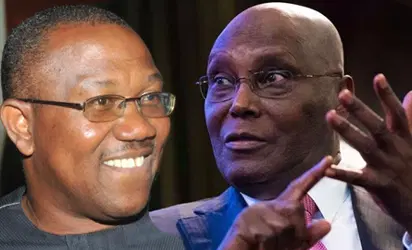
A coalition of opposition leaders, including former Vice President Atiku Abubakar and Labour Party’s 2023 presidential candidate Peter Obi, is intensifying efforts to find a unified political platform to challenge President Bola Tinubu and the All Progressives Congress (APC) in the 2027 general elections. The group met in Abuja, joined by prominent figures such as former Rivers State governor Rotimi Amaechi, former Secretary to the Government of the Federation Babachir Lawal, PDP Board of Trustees Chairman Senator Adolphus Wabara, and several other political heavyweights.
The meeting, held at the Abuja Continental Hotel and convened by the National Political Consultative Group North, was disrupted by delegates from Jigawa State who protested the nomination of a representative they claimed was imposed on them. The disruption led to a brief commotion, requiring intervention from security personnel to protect key figures like Atiku, Obi, and Amaechi. Calm was eventually restored, and new representatives were selected to continue the discussions.
The coalition remains divided on whether to adopt a new political party, fuse into an existing one, or form an alliance similar to the defunct Alliance for Democracy (AD) and All Peoples Party (APP). While the chairman of the African Democratic Congress (ADC), Chief Ralphs Nwosu, announced that the ADC had been chosen as the coalition’s platform, Peter Obi reiterated his commitment to contesting on the Labour Party ticket, surprising some stakeholders and highlighting ongoing internal crises within the LP.
Dr Umar Ardo, convener of the League of Northern Democrats, revealed that two committees have been set up: one to consider the feasibility of registering a new party and another to explore merging with an existing party. Former Cross River State governor Liyel Imoke and former Rivers State governor Rotimi Amaechi were appointed to lead these committees.
During consultations with northern leaders, Obi emphasized the potential of the North to drive national transformation, urging a shift away from voting based on religion and ethnicity toward competence and capacity. He pointed to the decline of Kano’s industrial sector as a sign of broader economic challenges and called for trust and unity among Nigerians to address the country’s pressing issues.
As coalition talks continue, a definitive decision on the platform is expected within two weeks, with stakeholders weighing the best strategy to present a formidable challenge to the APC in the next general election.






